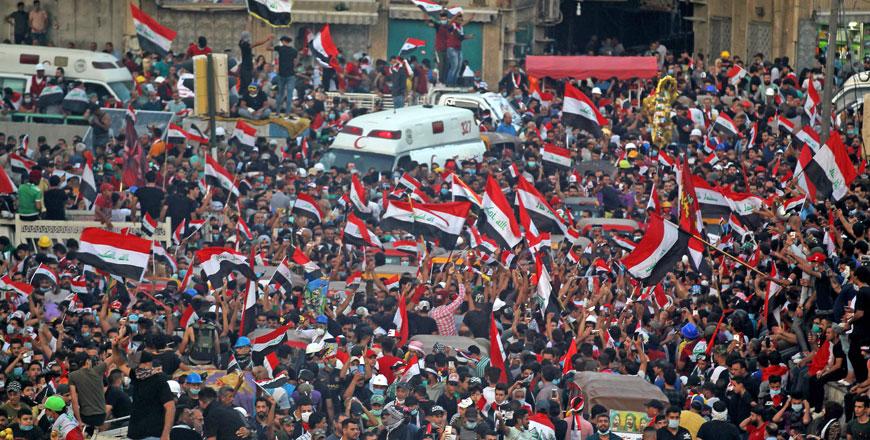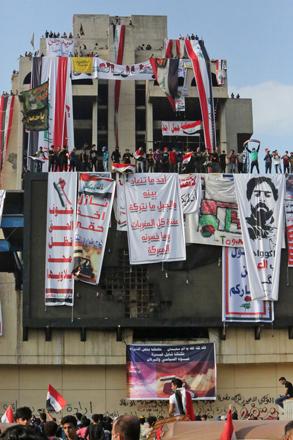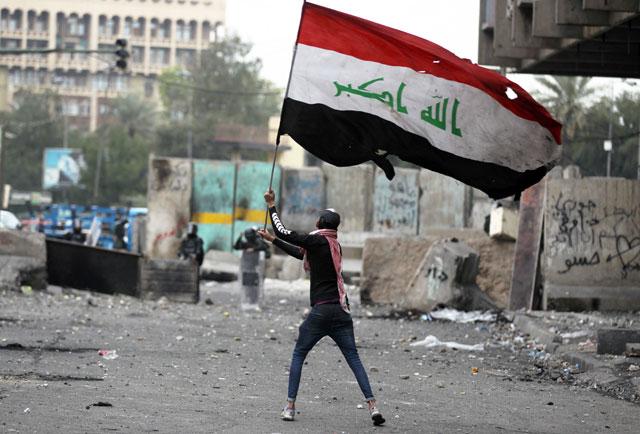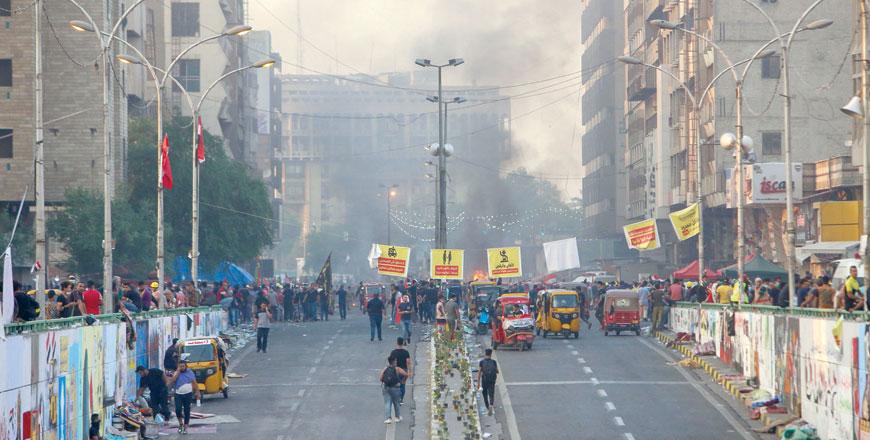You are here
Iraqi president says PM willing to resign, vows early polls
By AFP - Oct 31,2019 - Last updated at Oct 31,2019

Iraqi demonstrators chant slogans and wave their country's national flags during ongoing anti-government demonstrations at Tahrir Square in the capital Baghdad on Wednesday (AFP photo)
BAGHDAD — Iraqi President Barham Saleh vowed Thursday to hold early parliamentary elections once a new law is passed and said the country's embattled premier would resign if an alternative was found.
The reforms, announced in Saleh's first televised address in weeks, appear unlikely to appease Iraqis protesting in Baghdad and the south to demand an overhaul of the political system.
"I will agree on early elections based on a new electoral law and new electoral commission," Saleh said, adding that the draft would be submitted to parliament next week.
He said Prime Minister Adel Abdel Mahdi was ready to step down but there was so far no one to take his place.
"The prime minister expressed his willingness to submit his resignation, asking the political parties to reach an agreement on an acceptable alternative", Saleh added.
Such a consensus would "prevent a constitutional vacuum", he said.
According to Iraq's 2005 constitution, the prime minister can be put to a vote of no confidence based on a request by either the president or lawmakers.
It does not address what happens if the premier resigns.
Abdel Mahdi, 77, came to power a year ago through a tenuous partnership between populist cleric Moqtada Sadr and paramilitary leader Hadi Al Ameri.
Sadr had called for the PM to resign and for early elections to be held, but Abdel Mahdi dismissed his demands in a letter earlier this week.
“If the goal of elections is to change the government, then there is a shorter way: For you to agree with Mr Ameri to form a new government,” Abdel Mahdi wrote.
According to Iraq’s complex confessional system, the prime minister is Shiite Muslim, the president is a Kurd and the speaker of parliament is Sunni Muslim.
Protests continue
Demonstrators came out in force on Thursday across the Shiite-majority south despite efforts to quell them with curfews, tear gas or live fire.
The southern city of Diwaniyah saw its largest rallies yet: Students, teachers, farmers and health workers hit the streets as government offices remained closed.
In Basra, demonstrators cut off a main road leading to the Umm Qasr Port, its authorities said, one of the main import zones for food and other supplies into Iraq.
In Baghdad, crowds occupied the emblematic Tahrir (Liberation) Square for the eighth consecutive day.
“We’re tired of the whole situation over the past 16 years. The country went from bad to worse,” said Salwa Mezher, a middle-aged woman protesting with the Iraqi flag around her shoulders.
Since the US-led invasion that toppled Saddam Hussein in 2003, Iraq’s political system has been gripped by clientelism, corruption and sectarianism.
Getting a job in government, the country’s biggest employer, is often secured with bribes or connections.
One in five Iraqis live below the poverty line and youth unemployment stands at 25 per cent, despite the vast oil wealth of OPEC’s second-largest crude producer.
That inequality has been a rallying cry for protesters.
“Our problem isn’t just with Adel Abdel Mahdi, it’s with them all,” said Mezher, before adding a refrain popularised in this month’s protests: “Weed them all out!”
The protests are unique in Iraq’s recent history for their fury at the entire leadership, even typically revered clerics.
“We don’t want them, so let them leave. We also don’t want the clerics — they have no business in politics,” said Hoda, a 59-year-old in a headscarf and sunglasses.
Demonstrators packed onto two bridges leading to the Green Zone, where government buildings and foreign embassies are based, setting up barricades to face off against riot police trying to hold them off with tear gas.
Late on Wednesday, a rocket attack hit a checkpoint near the US embassy, killing one Iraqi military member and wounding others, security sources told AFP.
‘Trapped, dependent’
At least 257 people have died and 10,000 have been wounded since protests broke out on October 1, with 100 people losing their lives in the last week, the Iraqi Human Rights Commission said.
Abdel Mahdi, 77, came to power a year ago through a tenuous partnership between Sadr and Hadi Al Ameri, a member of the powerful Hashed Al Shaabi paramilitary force.
That alliance has frayed in recent months, and Sadr threw his weight behind the protests while Ameri and his allies backed the government.
A rapprochement built on Abdel Mahdi’s ouster appeared close on Tuesday night, but disagreements over who could replace him seemed to have slowed down the process.
Any candidate would have to be “presentable to the parliament and accepted by the streets”, said Maria Fantappie, an expert at the International Crisis Group.
“A consensus candidate with a technocratic background? We know the ending of that story,” said Fantappie, referring to Abdel Mahdi’s rocky tenure.
“He will once again be trapped and dependent on these two blocs, and it will bring the same kind of discontent in the streets.”
Related Articles
BAGHDAD — The future of Iraq's embattled premier was in the hands of his onetime parliamentary backers Wednesday, as they deliberated over h
NAJAF, Iraq — Populist cleric Moqtada Sadr returned to Iraq Saturday with a threat to organise protests outside parliament unless lawm
BAGHDAD — Iraqi forces fired live ammunition on Saturday as they pushed towards Baghdad's main anti-government protest camp, after political














